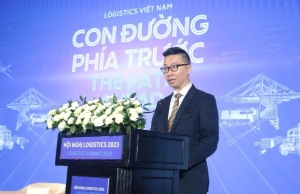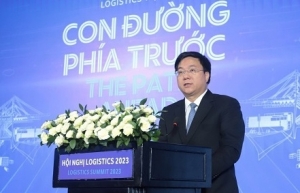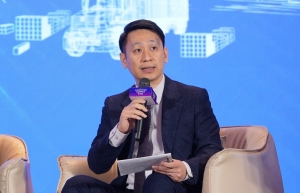Breakthroughs pinpointed for Vietnam’s logistics sector
 |
| Breakthroughs pinpointed for Vietnam’s logistics sector, Photo: Le Toan |
Deputy Minister of Planning and Investment Tran Duy Dong noted at the summit, themed “The Path Ahead”, that Vietnam is considered to have plenty of potential and suitable advantages to promote the development of the logistics service industry in the years ahead.
“We are located at the gateway of international trade, and have a strategic position in the global supply chain. With a growing economy, a constantly improving infrastructure system, a population of 100 million people with a rapidly growing middle class, and strong development of e-commerce, we have absolute confidence that Vietnam’s logistics industry will continue to have breakthroughs in the near future,” Dong said.
As the economy at home and abroad recovers from a few tough years, production, business, and import and export activities will regain growth momentum and demand for logistics activities will increase strongly.
“The presence of foreign investors with large-scale projects in Vietnam not only helps to make an important contribution to increasing the capacity of the economy, but it also promotes trade in goods, thereby contributing to the development of the Vietnamese logistics industry as a whole,” Dong added.
According to consulting firm Agility’s assessment, Vietnam has the ability to draw in the most renowned businesses in the world, especially high-tech groups with plenty to offer.
Talking with VIR, Winnie Lam, general secretary of HKBAV and COO of Asivon Young Vietnam, said that Vietnam’s time to shine is now.
“Vietnam stands to gain with the ongoing China+1 strategy and is well positioned in the region to leapfrog others, especially if more attention can be put into ensuring value added services instead of just trying for cheaper services,” said Lam.
She added that China+1 is taking on a new meaning as Vietnam is now not only the +1 for those invested in China, but also for China’s own needs.
“Because Vietnam is up and coming, we should take advantage of adopting the newest technology whenever possible. The logistics sector in Vietnam has been experiencing growth in recent years, and is expected to continue to do so under the current economic situation, being the bright star in the region,” she said.
“Vietnam has plenty of free trade agreements in place, the supply chain is becoming more mature, and Vietnam also benefits from its massive coastline. These all play a significant role in shaping Vietnam’s economy,” Lam added.
According to the 2023 Logistics Performance Index published by the World Bank, Vietnam’s score increased to 3.3 compared to 3.27 points in 2018, ranking it fifth in the ASEAN region - behind Singapore, Malaysia, Thailand, and sitting alongside the Philippines.
According to Deputy Minister Dong, although Vietnam’s logistics sector has a rapid growth rate, in reality, there are still a number of problematic limitations. These include unsynchronised institutions and policies, limited transportation and logistics infrastructure capacity, and a lack of multi-modal transport corridors, all while the need for high-quality transshipment of goods continues to increase.
“Moreover, Vietnam still lacks centralised logistics zones with the most strategic locations, as well as strong connections with ports, airports, national highways, and production facilities. In addition, the operations of logistics enterprises still have many limitations in terms of scale of operation, capital, and especially the lack of talented logistics experts,” he added.
For some of the participants at the summit last week, the most difficult obstacle to overcome is infrastructure.
Infrastructure planning can lack uniformity and regulation from state management agencies is one of the biggest bottlenecks in the industry. Besides that, some said, local infrastructure planning at the locality level can be too vague and not tailored to the condition and strength of each locality.
What makes many businesses worried is that currently, transportation costs on Vietnam’s total logistics costs are at a very high level, up to more than 60 per cent and about twice as high as other countries.
Vietnam currently has about 34,000 businesses in logistics services, but they are mainly small in size and with very limited ability to access international markets. Businesses like these have missed many opportunities to expand their markets and revenues.
Elias Abraham, CEO of Zim Integrated Shipping Company, also assessed that goods to Vietnam only pass through central areas and main ports, so they must be transported over long distances and at high costs.
“Businesses have no other choice. Therefore, various ports in Long An, Phu Yen, and Quang Nam provinces need investment attention,” said Abraham.
Julien Brun, CEO of CEL Vietnam Company, added that in the competition with other countries and regions in foreign direct investment attraction and logistics services, a low price advantage is not enough. Vietnam needs to promote logistics as well as green transformation, which are the factors that the new generation of foreign capital flows towards.
“Vietnam has production costs about 4 per cent lower than India, labour costs are a tenth cheaper, and infrastructure is nearly equivalent, but logistics costs and delivery times are higher and longer,” said Brun.
| Edwin Chee - COO, SLP Vietnam
Vietnam needs to prepare a vision for a further 5-10 years in terms of its logistics and supply chain systems. In particular, to pull in and retain multinational businesses, now is the time for Vietnam to review these systems to support and retain such groups in the best manner. Our facilities are applying the most advanced technology with automation, robotics, and a full state-of-art supply chain. For example, we need just 3-5 people to operate an 8,000sq.m facility with automation facilities and a modern machinery system. Vietnam has achieved many good results in attracting multinational businesses that carry out similar advanced works. The government has created many mechanisms and specific actions to attract capital flows. In addition, currently, Vietnam has the opportunity to draw in overseas funding flows with an increasingly high position in the international arena. Looking at the next two years, I see that Vietnam will have many profound opportunities in developing the logistics chain. The current difficulties of its economy are only short-term and it is expected that Vietnam will continue to entice more investment capital flows next year. As the country develops more and attracts more investment, it also needs to diversify, not just focusing on one area or one province, but diversifying into different regions simultaneously. For example, when electronic businesses invest in Vietnam, they mainly focus on the central and northern regions. However, these areas are showing signs of congestion. Therefore they have to look for other areas to move to. Another problem is human resources. Even a country as huge as China lacks skilled workers, so when capital flows shift to Vietnam, provinces such as Binh Duong can be short of some types of workers. With rich experiences from different markets, a strong global network, and a long-term vision in Vietnam, we are committed to supporting the growth of the logistics sector here, becoming a partner of choice for customers in their expansion and development journey. Although just entering the Vietnamese market in 2020, SLP has quickly expanded operations with more than one million sq.m of modern, high-quality warehouse space in nine projects strategically located in key areas around Hanoi and Ho Chi Minh City, such as Bac Ninh, Haiphong, Long An, and Vinh Long. |
What the stars mean:
★ Poor ★ ★ Promising ★★★ Good ★★★★ Very good ★★★★★ Exceptional
Related Contents
Latest News
More News
- SK Innovation-led consortium wins $2.3 billion LNG project in Nghe An (February 25, 2026 | 07:56)
- THACO opens $70 million manufacturing complex in Danang (February 25, 2026 | 07:54)
- Phu Quoc International Airport expansion approved to meet rising demand (February 24, 2026 | 10:00)
- Bac Giang International Logistics Centre faces land clearance barrier (February 24, 2026 | 08:00)
- Bright prospects abound in European investment (February 19, 2026 | 20:27)
- Internal strengths attest to commitment to progress (February 19, 2026 | 20:13)
- Vietnam, New Zealand seek level-up in ties (February 19, 2026 | 18:06)
- Untapped potential in relations with Indonesia (February 19, 2026 | 17:56)
- German strengths match Vietnamese aspirations (February 19, 2026 | 17:40)
- Kim Long Motor and AOJ Suzhou enter strategic partnership (February 16, 2026 | 13:27)











 Tag:
Tag:




















 Mobile Version
Mobile Version